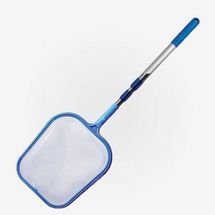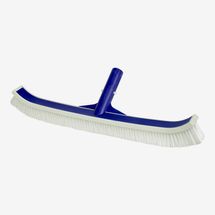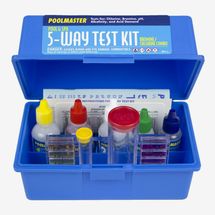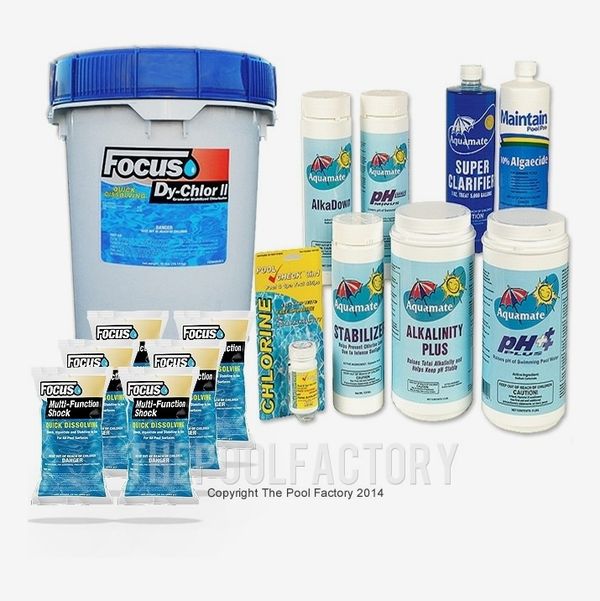
With most water parks and public pools closed, and the inevitable heat wave on the horizon, you may be trying to find ways to stay cool outside. While we’ve been tracking the growing popularity of kiddie pools and splash pads and stock tank pools, lots of people are looking for a more permanent solution: The aboveground pool, a long-time suburban staple, is suddenly quite in demand. In fact, a few weeks back our colleagues over at Curbed wrote that this was the summer aboveground pools finally got their due: “Even for those who weren’t pool-heads prior to the pandemic, the urge to feel something refreshing — not just the stale bite of recirculated air-conditioning — has reached a fever pitch, and aboveground pools have cannonballed into the spotlight,” writes Sarah Baird.
Because the humble aboveground pool has suddenly become the latest social distancing hot-ticket item, it may be difficult to get your hands on one. “So many people have had to change their summer plans with summer camps closed and beaches allowing limited visitors,” explains Barry Vineberg, owner of Long Island Swim-Pool Service, who told us that he noticed a surge in demand starting the last week of March going into early April. “Pools have been harder to find than toilet paper.” Andrew Bari, owner of Westrock Pool and Spa, which has served the Hudson Valley area for over fifty years, says that they are currently taking orders for 2021, because of “huge demand.” While Vineberg says that pools are sold out pretty much everywhere, you can occasionally get lucky by continuously checking for stock updates on online retailers like The Pool Factory (which he says is his favorite because it’s the easiest to navigate and has the best selection). But be warned: “When they restock, they sell out in 20 minutes,” so you have to move fast.
Scope out your space
While aboveground pools are not nearly as complicated to install as their inground counterparts, there is still a checklist of factors you’ll want to be aware of before buying (assuming you can find one in stock). “Every town is different,” when it comes to zoning regulations, explains Bari. You’ll need to find out the necessary distance between your pool and the property line, as well as the distance between your pool and your house. To confirm your community’s regulations and to check to see if you’ll need a permit, a visit, or call to the zoning board and building department is a good first step. “You will also be required to hire a licensed electrician to run a 110 dedicated electric line,” to power the pump and filter, says Bari.
You’ll also want to survey the landscape of your yard to make sure it is suitable for a pool. You want the ground to be level and clear of large debris like tree stumps or rocks, says Kolio Balkov, a pool installation expert at New Jersey-based NJJ Pool Installations.
Safety first
HomeAdvisor expert Dan DiClerico told us it’s also a good idea to call your insurance provider to check your homeowners coverage. “Child safety considerations are also important,” he says. “The number one safety rule is to never leave a child unattended near a pool,” but you should also consider installing a safety ladder or childproof fence, especially if your pool also has a deck. In some towns, this is a mandatory requirement, adds Balkov.
Consider cost
Once you’ve checked these boxes, then you can start shopping. When it comes to cost, “For structural aboveground pools, most people spend between $1,000 and $4,000 just on the pool itself, with the average being $2,500,” says DiClerico. DiClerico also says to budget an additional $1,000 to $3,000 for labor and installation costs. “Average, all in-cost is around $5,000,” he notes.
Soft- vs. hard-sided pools
Structured aboveground pools come in two categories: soft-sided and hard-sided. A soft-sided aboveground pool is the less expensive of the two, “but may start to show signs of wear and tear within a single season,” says DiClerico. A hard-sided aboveground pool, typically made from steel or heavy duty PVC, could easily last a decade, he notes, though you may have to eventually replace the liner. Aboveground pools also come in a variety of sizes and shapes, explains Bari. If you have the room, Bari always suggests choosing a round-shaped swimming pool over an oval, because “it’s stronger, cheaper to build, and provides more swimming area.”
Know when to hire a professional
“A lot of these are sold as kits and are marketed as DIY-friendly,” DiClerico says. “And they are, but I put the level of difficulty as moderate to high.” In other words, if you are an experienced DIY-er, you can probably erect your pool in a weekend (or even a single afternoon). For everyone else, he recommends hiring an installation professional. Bari notes that the upside to buying a pool in-person from a local store is that they often offer packages that include installation and service to guide you through the permit process.
Aboveground Pool Accessories
Keep in mind that an aboveground pool is going to require regular cleaning and maintenance to keep the water clean. For a standard starter kit, DiClerico suggests buying a skimmer to remove any debris like leaves or bugs, a soft-bristled scrub brush to scour the liner, a water testing kit to check the balance of the chlorine and chemical levels of the water, and the chemicals and chlorine themselves.
“We highly recommend a chlorine chemical package that includes everything you need to keep your pool water crystal clear,” says Vincent Carrotozzolo of The Pool Factory.
The Strategist is designed to surface the most useful, expert recommendations for things to buy across the vast e-commerce landscape. Some of our latest conquests include the best acne treatments, rolling luggage, pillows for side sleepers, natural anxiety remedies, and bath towels. We update links when possible, but note that deals can expire and all prices are subject to change.











